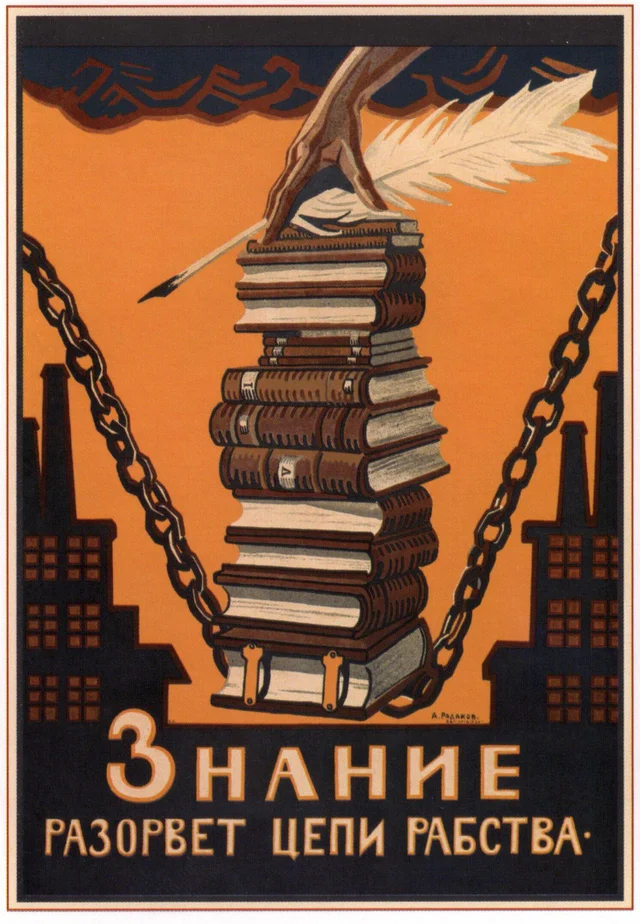More languages
More actions
Jucheguevara (talk | contribs) (created page) Tag: Visual edit |
General-KJ (talk | contribs) (Reorganized) Tag: Visual edit |
||
| (4 intermediate revisions by one other user not shown) | |||
| Line 1: | Line 1: | ||
'''Literacy campaigns''' | '''Literacy campaigns''' are campaigns to abolish illiteracy in a region by an organization or government in order to give the entire [[proletariat]] the ability to read and access [[education]]. These campaigns have often been carried out by [[Revolution|revolutionary]] movements and governments which has historically helped [[Vanguard party|vanguard parties]] in gaining mass support among the exploited classes previously denied education by the [[bourgeoisie]]. | ||
[[File:Knowledge will break the chains of slavery - Soviet Poster.webp|alt=Soviet poster that says "Knowledge will break the chains of slavery" (Знание разорвет цепи рабства) with books weighing down on chains|thumb|402x402px|Soviet poster that says "Knowledge will break the chains of slavery" (Знание разорвет цепи рабства)]] | [[File:Knowledge will break the chains of slavery - Soviet Poster.webp|alt=Soviet poster that says "Knowledge will break the chains of slavery" (Знание разорвет цепи рабства) with books weighing down on chains|thumb|402x402px|Soviet poster that says "Knowledge will break the chains of slavery" (Знание разорвет цепи рабства)]] | ||
Examples of this phenomenon include the Russian Revolution<ref>{{News citation|title=Education, literacy, and the Russian Revolution|url=https://isreview.org/issue/82/education-literacy-and-russian-revolution/index.html}}</ref>, the Cuban Revolution<ref>{{News citation|title=The Cuban Literacy Campaign|url=https://sites.miamioh.edu/hst-journeys/2018/05/the-cuban-literacy-campaign/}}</ref> | Examples of this phenomenon include the [[Russian revolution|Russian Revolution]]<ref>{{News citation|title=Education, literacy, and the Russian Revolution|url=https://isreview.org/issue/82/education-literacy-and-russian-revolution/index.html}}</ref>, the [[Cuban Revolution]]<ref>{{News citation|title=The Cuban Literacy Campaign|url=https://sites.miamioh.edu/hst-journeys/2018/05/the-cuban-literacy-campaign/}}</ref> and the [[New Democratic Revolution|Chinese Revolution]].<ref>{{News citation|title=‘The Single Greatest Educational Effort in Human History’|url=https://www.languagemagazine.com/the-single-greatest-educational-effort-in-human-history/}}</ref> | ||
During [[Thomas Sankara]]'s 4 years of power in [[Burkina Faso]], 350 schools were constructed and resulted in a literacy rate increase of 60%.<ref>{{News citation|title=Burkina Faso Remembers Death of Socialist President Sankara|url=https://www.telesurenglish.net/news/Burkina-Faso-Remembers-Death-of-Socialist-President-Sankara-20211015-0002.html}}</ref> | |||
The center of global [[imperialism]] and [[capitalism]], the [[United States of America|United States]] is currently facing a crisis of illiteracy,<ref>{{News citation|title=Crisis Point: The State of Literacy in America|url=https://resilienteducator.com/news/illiteracy-in-america/}}</ref> scoring much lower in international studies among its economic peers, and even lower than poorer counterparts such as [[Republic of Cuba|Cuba]].<ref>{{News citation|title=How Cuba became more literate than the United States|url=https://columbusfreepress.com/article/how-cuba-became-more-literate-united-states}}</ref><ref>{{News citation|author=Bob Fitrakis|newspaper=[[Workers Today]]|title=How Cuba became more literate than the United States|date=2022-04-14|url=https://workers.today/how-cuba-became-more-literate-than-the-united-states/}}</ref> | |||
== See also == | == See also == | ||
* [[Each One Teach One|Each one teach one]] | * [[Each One Teach One|Each one teach one]] | ||
*[[Consciousness]] | |||
== References == | == References == | ||
<references /> | |||
[[Category:Education]] | |||
Latest revision as of 14:18, 12 October 2024
Literacy campaigns are campaigns to abolish illiteracy in a region by an organization or government in order to give the entire proletariat the ability to read and access education. These campaigns have often been carried out by revolutionary movements and governments which has historically helped vanguard parties in gaining mass support among the exploited classes previously denied education by the bourgeoisie.

Examples of this phenomenon include the Russian Revolution[1], the Cuban Revolution[2] and the Chinese Revolution.[3]
During Thomas Sankara's 4 years of power in Burkina Faso, 350 schools were constructed and resulted in a literacy rate increase of 60%.[4]
The center of global imperialism and capitalism, the United States is currently facing a crisis of illiteracy,[5] scoring much lower in international studies among its economic peers, and even lower than poorer counterparts such as Cuba.[6][7]
See also[edit | edit source]
References[edit | edit source]
- ↑ "Education, literacy, and the Russian Revolution".
- ↑ "The Cuban Literacy Campaign".
- ↑ "‘The Single Greatest Educational Effort in Human History’".
- ↑ "Burkina Faso Remembers Death of Socialist President Sankara".
- ↑ "Crisis Point: The State of Literacy in America".
- ↑ "How Cuba became more literate than the United States".
- ↑ Bob Fitrakis (2022-04-14). "How Cuba became more literate than the United States" Workers Today.
